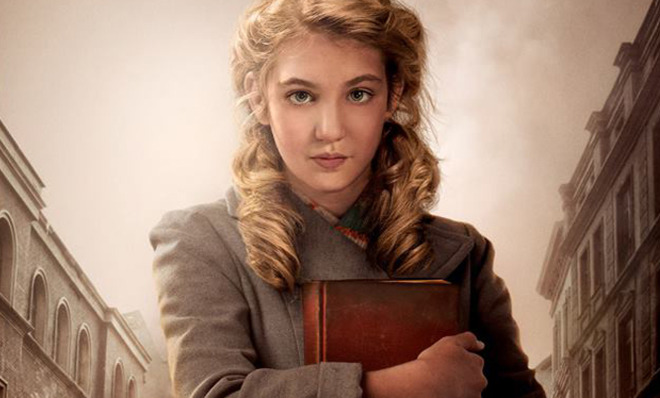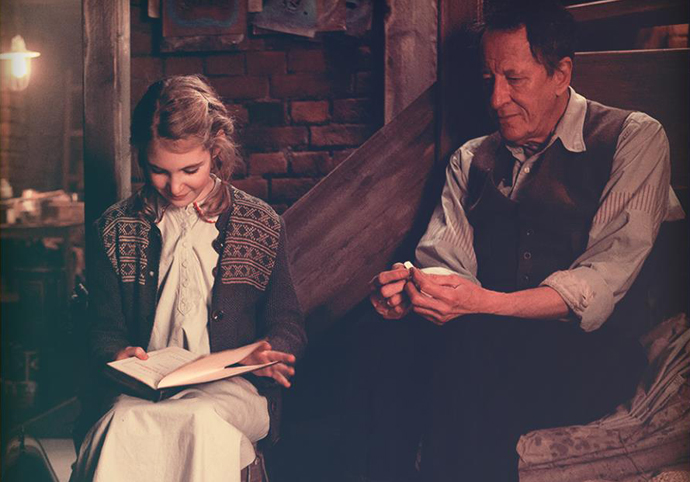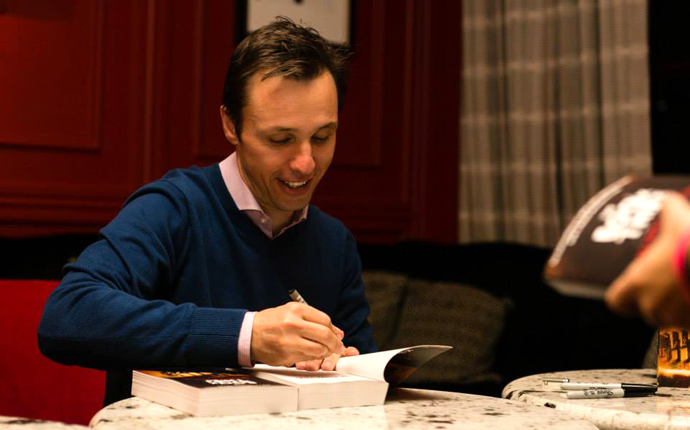The Book Thief: An interview with the stars, director, and author
Markus Zusak's best-selling, critically acclaimed Holocaust novel is finally hitting the big screen

A free daily email with the biggest news stories of the day – and the best features from TheWeek.com
You are now subscribed
Your newsletter sign-up was successful
Few recent novels have made as much of a splash as Markus Zusak's The Book Thief, which quickly became a worldwide bestseller upon its publication in 2005. The book — which focuses on an adopted little girl named Liesel growing up in Germany during the Holocaust — remains extremely popular, and its profile is about to rise again: Today, a cinematic adaptation starring Oscar winner Geoffrey Rush and newcomer Sophie Nelisse expands to theaters nationwide.
In the film, Liesel (Nélisse) serves as the protagonist, and soon after she moves into a new home, her adopted parents begin hiding a young Jewish man named Max (Ben Schnetzer) in their basement to prevent him from being killed. The story's title refers to Liesel's thievery of books early on in the film as she learns how to read with the support of her adopted father Hans Hubermann (Rush). The Book Thief is a very personal story for Zusak, whose German mother was a young girl during the Holocaust.
I recently sat down with stars Geoffrey Rush and Sophie Nelisse, director Brian Percival, and author Markus Zusak. Here's a (slightly edited) transcript of our conversation.
The Week
Escape your echo chamber. Get the facts behind the news, plus analysis from multiple perspectives.

Sign up for The Week's Free Newsletters
From our morning news briefing to a weekly Good News Newsletter, get the best of The Week delivered directly to your inbox.
From our morning news briefing to a weekly Good News Newsletter, get the best of The Week delivered directly to your inbox.

Geoffrey and Sophie — how did you end up starring in The Book Thief?
Rush: They sent me the screenplay, and it was an offer to play Hans. Shamefully, I hadn't read the book — written by my fellow countryman Markus Zusak — but I read it instantly because I loved the story and the screenplay, and wanted to see [from] a much fatter 580-page book what other things happened. Or what I could take from the book from the inner thoughts of the character and apply to [the] minimalist screen dialogue.
Nélisse: They called me in to audition about this time last year — and actually I didn't want to audition, because I wanted to continue gymnastics and go to the Olympics. I auditioned anyway, just for a fun thing that I knew I was never gonna get. I was never gonna get the part, and I remember at the second audition reading the script [on] the plane. It was the first time a script had made me cry. I thought. "Oh, that's really good." I really fell in love with the character and the story.
What kind of research did you do for the role?
A free daily email with the biggest news stories of the day – and the best features from TheWeek.com
Nélisse: I watched a lot of movies: Schindler's List, The Reader, The Boy in the Striped Pajamas, Life is Beautiful and The Pianist. It was great that [The Book Thief] was shot in Berlin — because just walking through the city, there's so many walls and posters telling stories about what happened and talking about history. Just seeing the Berlin Wall, or going to visit bomb shelters, or going to the Jewish museum — it's very interesting.
Geoffrey, there are several highly acclaimed movies about the Holocaust. Was there something about The Book Thief that stood out to you? Something you hadn't seen before?
Rush: British war films, in my childhood and beyond, were always from a British viewpoint. Germans were probably stereotyped as psychopathic Nazis — and I can't recall seeing average German people in a small town, and how that particular fanatical ideology impacted their lives. I think from Markus' point of view — and what I believe has been taken into the screenplay — is that there's a kind of original empathy to try and work out. When I read the stories, I felt that this could happen.
You recently hosted a screening of The Book Thief at the Holocaust museum in Washington, D.C., for a group of Holocaust survivors. What was their reaction to the film?
Rush: I met four or five gentlemen who were all teenagers at the time. One guy in particular had been sheltered just on the outskirts of Paris when it was occupied by the Nazis and he said the head of the family — the father — was so like Hans Hubermann [Rush's character in the film]. He was a very average guy, and he owes his life to him. I think he was hiding for two to three years. It's good to hear those stories, because there have been some critical responses to the film where they seem to talk as if Max and Anne Frank were the only two people hidden during the war. We know that that was a genuine phenomenon all over Europe. Not just in Germany. There was protection of Jews by hearty and very brave and ethically driven people — from Norway to Poland to wherever — so I think that's an important aspect of the story. It must be a very difficult experience for them to go back to have those memories prodded… or maybe it them helped in some way. I don't know. They said the film captures a very credible quality of what it was like to be a hidden refuge.
Percival: I spoke to a couple of people. It's quite humbling to actually talk to people who've lived through that… to actually shake the hand of someone who went through that is quite remarkable and quite a moving experience. One gentleman was helped by a German civilian. He didn't know it at the time, but he was put on a work camp — which was actually making tarmac roads to the factory that manufactured the gas that killed everyone. He didn't realize that the German civilian who chose him for it knew that he was gonna be able to escape because of that. That's quite moving to talk to somebody who's lived through that. It's really quite something. The response, thankfully, was really positive with both the gentlemen that I spoke to. I think anybody dealing with such a sensitive issue would have a worry that in some way, albeit unintentionally, you might offend somebody.

Markus — Did you talk to any survivors before writing the book?
Zusak: Yes, of course. I went to a Jewish museum. One of the experiences I had there is that the survivors are the ones who take you around. There was a school group that I was on the back of and there was a guy that said, "I'll take you around on your own." His name was Charlie, and he took me around. And then he was talking to me, and there was a lady who worked in the shop there and he starts telling her my story. That my parents were German and Austrian. And this lady, who was probably in her late 40s or early 50s, said, "Ah, so they're living with the guilt, are they? They're dealing with the guilt." And this guy — who is a Holocaust survivor — jumped in and said, "No, no. They were really young kids." And it was so generous of him. He's defending my parents, who were children. There's just something so gracious and beautiful about it. You never learn what you're gonna learn the way you think you are.
What was the reaction when the book was originally published?
Zusak: I had some really interesting experiences talking to people and they've always been really sweet. Well, not always. Like 99.9 percent of the time. I've had one really rough experience. I met a guy and he said to me, quite directly in front of 30 or 40 other people, that he believed that my mom should've been killed. He said, "Your mom deserved to be killed and deserved to die." I had to very respectfully say, "I can't begin to imagine what you've gone through to think that." I remember walking away thinking, "How do I take this experience?" This was in Hong Kong, of all places, but it was a survivor who was there. How can you wish death on a seven-year-old or a six-year-old at that time? But you can also understand, because it happened to so many people. What I ended up thinking was, "No, it wasn't that my mom deserved to die. It was that all those children, and all those people, deserved to live."
John Hanlon is a contributing editor at Townhall Magazine and a freelance film critic. He has written for CNN.com, USAToday.com, Big Hollywood, the Daily Caller, and Townhall.com as well as numerous other outlets. His movie reviews appear on Big Hollywood, RottenTomatoes.com, and JohnHanlonReviews.com. Hanlon has also appeared on "The Dennis Miller Show," "The Hugh Hewitt Show," and the Reelz television program "Mark at the Movies." A native of Massachusetts, Hanlon now lives in the D.C. suburbs.
-
 Political cartoons for February 16
Political cartoons for February 16Cartoons Monday’s political cartoons include President's Day, a valentine from the Epstein files, and more
-
 Regent Hong Kong: a tranquil haven with a prime waterfront spot
Regent Hong Kong: a tranquil haven with a prime waterfront spotThe Week Recommends The trendy hotel recently underwent an extensive two-year revamp
-
 The problem with diagnosing profound autism
The problem with diagnosing profound autismThe Explainer Experts are reconsidering the idea of autism as a spectrum, which could impact diagnoses and policy making for the condition